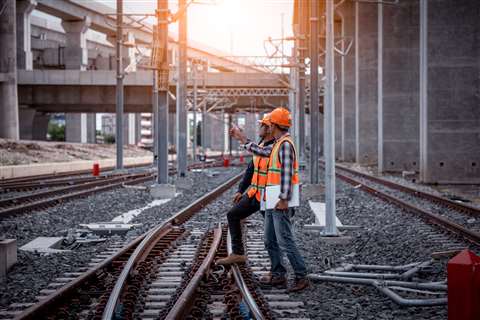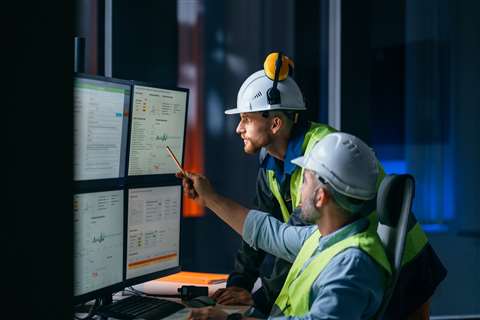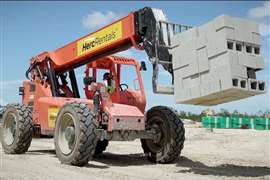How can construction solve the digital skills crisis?
16 December 2022
Caroline Evans, corporate strategy director for Arden University discusses how employers can develop a growth mindset to upskill their workforce, and why higher education should join forces with the construction industry to develop corporate learning schemes that meet the needs of the future of the sector
The construction industry and higher education need to work together to help upskill and develop talent, particularly as automation is potentially set to eradicate millions of construction jobs worldwide by 2030.
 Photo: Adobe Stock
Photo: Adobe Stock
Corporate learning schemes help employees gain the skills their organisation needs, but to make real change in the talent pool, we need a growth mindset from both employers and workers.
Addressing the digital skills crisis in construction
In the UK alone, the workforce is about to have a rude awakening. Research suggests that by 2030, 30% of all jobs in the UK could be eradicated due to automation changing the workforce.
But the construction industry is aware of the significant value behind the increase in productivity automation can bring.
However, a large majority in this sector are struggling to capture the full potential of digital transformation and are, therefore, failing to deliver a satisfactory return on investment.
In addition to this, the 2030 Workforce Report found that 20% of people working in the construction sector felt they had a digital skills gap and weren’t prepared for the technological changes at hand.
As digital technology plays a more prominent role in most jobs, and more employees work alongside tech, basic digital literacy has become an essential skill, on par with reading and writing.
As more jobs require digital skills, upskilling the population is a key priority – particularly for the employees who may not have the digital skills to prepare them for the evolving jobs of the future.
Construction has already felt the impact of digital growth. The use of software-based design has revolutionised the beginning stages of designing a project, and the collection of data on finished buildings captured in cloud-based living models has helped the industry shift to a more sustainable future.
From the operational side, digital transformation has impacted the processes in factories and therefore changed supply chain journey.
Some companies have already begun using automated modular construction to ensure consistent production through 3D printing, with Volumetric Building Companies leading the way in this field.
Utilisation of data in construction
More and more companies in the construction industry are considering the digitisation of planning and management procedures, allowing further efficiency for those working on-site.
To fill the digital skills gap needed, companies can give their employees the opportunity to learn the new skills the construction sector is demanding.
With digital transformation representing the next generation of industrial change, companies can now act on the data they receive to become more responsive and resilient – not only beneficial for themselves but for their customers.
From data analysts to CAD technicians and geomechanics specialists, it is now up to education institutions to work with businesses to develop and upskill their workforce for the jobs of the future and not solely for the jobs of today.
The power of a growth mindset
To produce talent that realistically helps solve skills shortages and transform businesses, higher education institutions need to work with the construction industry to support workers to also adopt a growth mindset.
These days, the concept of a growth mindset is more broadly understood. With many self-starters finding their feet during the pandemic or people realising they wanted to change industries when countries were in lockdown, the concept of maintaining a ‘growth mindset’ became increasingly critical to success.
The growth mindset, once the preserve of behavioural and organisational psychologists, is now broadly recognised across business, particularly in learning and development.
As the realities of the pandemic unfurled, many individuals also came to feel a desire, or a need, to retrain, redevelop and keep learning.
For some, it was about wanting more from their working life, for others a matter of necessity as their industries ground to a halt.
 Photo: Adobe Stock
Photo: Adobe Stock
Either way, the upshot is that the capacity to keep on learning, throughout one’s career and life, is now recognised as one of the most critical capabilities in any organisation.
Even in roles that are seen as stable, unlikely to be eliminated by the progression of automation and digitisation, the need to constantly be able to learn new technologies and ways of working have become essential skills at every level.
As one CEO recently put it: “CEOs need to stop being know-it-alls and become learn-it-alls.”
These changes are challenging the long-held view of intelligence being inherent, a fixed mindset. Increasingly, it is viewed as a quality that can be developed and built.
How to develop knowledge and skills
A growth mindset is maintaining the belief that basic abilities are not fixed, and that intelligence can be developed over time; this, therefore, means your abilities and successes can improve with continued resilience, effort, and learning.
In a fast-changing working environment, this capacity is more important than it has ever been, and this will only become truer as we move into the future.
To teach the adaptable mindset businesses desire, employers need to work with higher education institutions to fill in the skills they need. The need for personalised education is vital, as well as the need for courses that teach ‘human’ skills.
How learners react when they are faced with challenges in their learning, is determined by their mindset – by giving them practical tasks, they will have the opportunity to improve and develop their knowledge, skills, and abilities with effort and good strategies.
This can be done with tasks that extend beyond answering questions in an exam and completing essays.
Teaching the ‘growth mindset’ and allowing learners to develop interpersonal skills requires practical assessments, which replicate the tasks learners will see in their working career.
This could be in the form of digital simulations, which expose learners to the real issues they will face at their job, or practical business strategies that are implemented, trialled, and tested out.
The importance of adapting to digital tools
Whether employers in the construction industry want to train workers to learn digital mediums or ensure they remain competitive by adopting the use of digital tools to understand data analytics or to train specialist technicians, for example, the need to be able to apply these skills to the industry is vital.
Those in construction already had to adapt quickly to the advancements and benefits that came with technology to keep up with the demands of the market throughout the pandemic.
Ensuring learners, whether they are returning to higher education or new to it, are given tasks that will help develop their own growth mindset, will help them develop the skills they need to keep up with constant change in the industry.
Corporate learning schemes help employees gain the skills their organisation needs, but we need engagement and a growth mindset from both workers and employers to make a change.
When developing our corporate learning programmes at Arden, for example, we work in partnership with industry partners to ensure the courses we’re providing not only deliver the skills and expertise they need their learners to develop, but that we support them in developing employees with growth mindsets.
In the current age where developments are occurring rapidly, resulting in the labour market evolving at a quicker pace, more education institutions need to offer tailored learning for businesses.
This also means that more organisations within construction need to seek out or consider personalised education for their employees when considering surviving the current, tough labour market.






